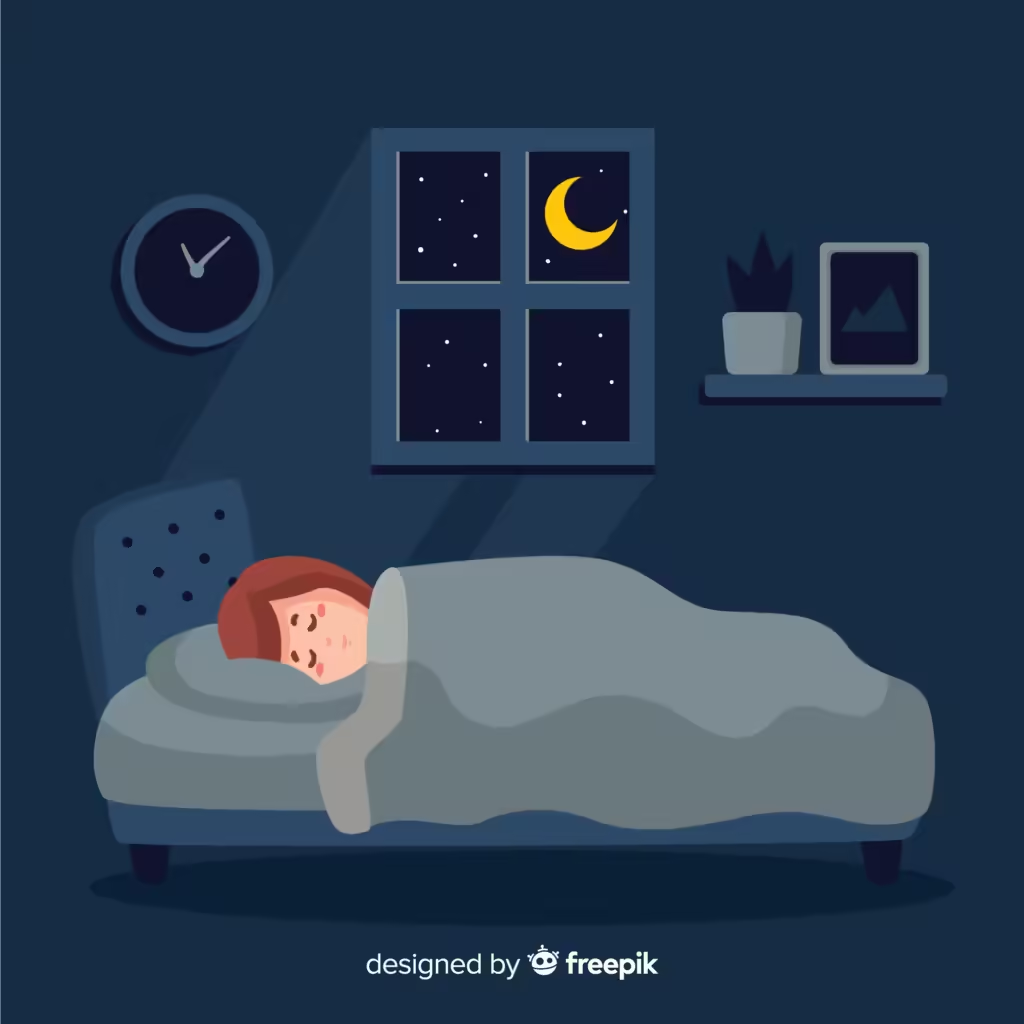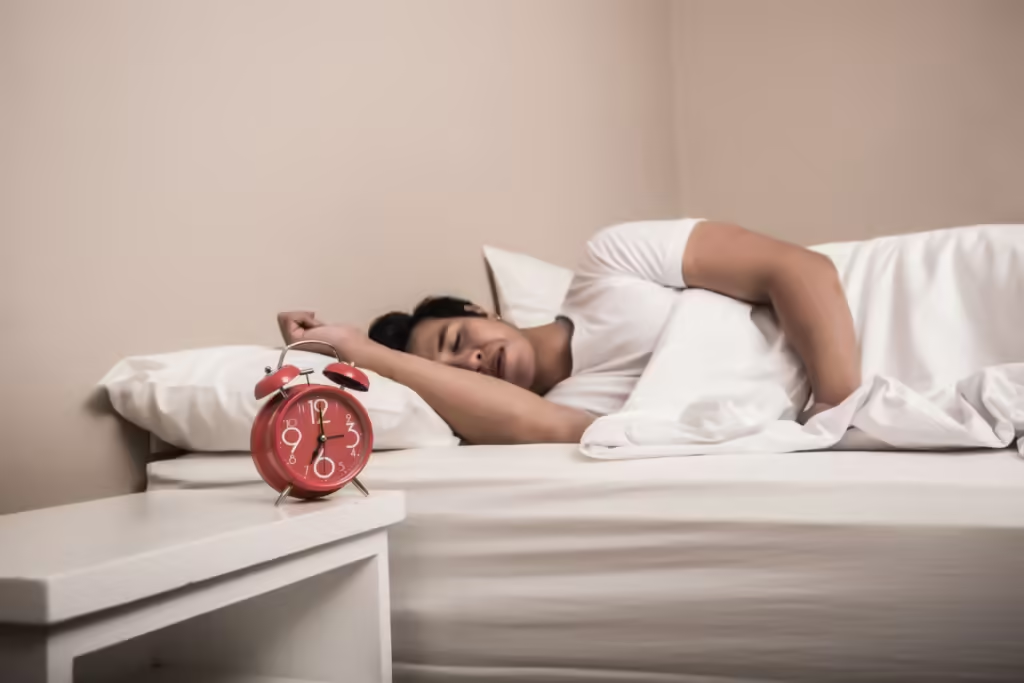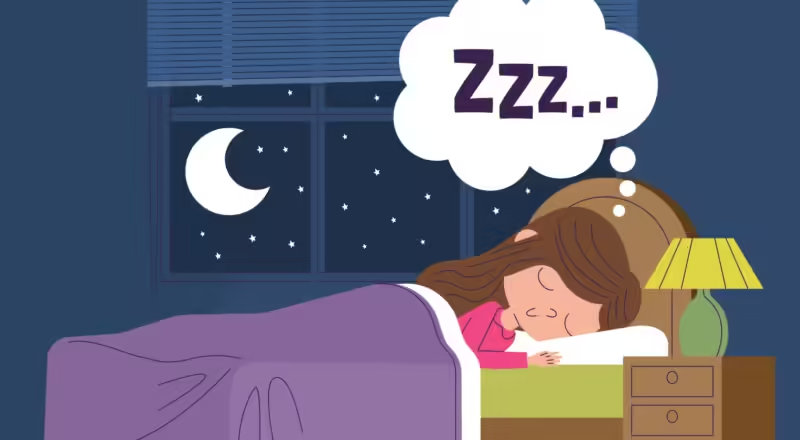Strategies for Using Sleep to Manage Stress and Anxiety: Unleash the Power of Sleep with 7 Proven Steps
Can’t Sleep Because You’re Stressed? 7 Sleep Tips to Calm Your Mind
Introduction:
Do you ever feel like stress and anxiety are keeping you up at night, and then a bad night’s sleep makes you even more stressed the next day? It’s a vicious cycle! But what if there was a powerful tool you could use to manage stress and anxiety, and it didn’t require any fancy equipment or expensive treatments? The answer might surprise you: sleep. In this article, we’ll explore 7 proven strategies for using sleep to manage stress and anxiety. By unlocking the power of a good night’s rest, you can finally break free from this cycle and start feeling your best.
Do you ever feel like you’re stuck in a cycle of stress and anxiety that keeps you up at night, and then a bad night’s sleep makes you even more stressed the next day?
You’re not alone! But what if there was a simple, powerful tool you could use to break free from this cycle and finally feel your best? The answer might surprise you: sleep.
This article will explore 7 proven strategies for using sleep to manage stress and anxiety. By unlocking the power of a good night’s rest, you can experience a calmer, happier, and healthier you. So, ditch the stress and anxiety and get ready to sleep your way to a better life!
Strategies for Using Sleep to Manage Stress and Anxiety:
This guide explores 7 proven Strategies for Using Sleep to Manage Stress and Anxiety. Discover how prioritizing sleep can unlock a happier, healthier you. [sleep quality, stress management, anxiety relief, sleep hygiene]. Learn more and start sleeping better tonight!
The Sleep, Stress, and Anxiety Rollercoaster: Understanding the Cycle
We’ve all been there: a stressful day leads to a restless night, and then that lack of sleep makes us even more stressed the next day. It feels like a never-ending cycle! But there’s a scientific reason for this. Sleep, stress, and anxiety are actually connected in a two-way street.
Poor Sleep Fuels Stress and Emotional Overload:
When we don’t get enough quality sleep, our bodies struggle to cope with stress hormones like cortisol. This can make us feel more on edge and irritable. On top of that, a sleep-deprived brain has trouble managing emotions effectively. So, everyday challenges can feel overwhelming, and our emotions can become intense and difficult to control.
Sleepless Nights and Heightened Anxiety:
The lack of rest from poor sleep can also worsen anxiety. When we’re stressed and anxious, it can be hard to quiet our minds and fall asleep. This can lead to sleep disturbances, like waking up frequently or having trouble falling asleep in the first place. Then, the cycle starts all over again.
Strategies for Using Sleep to Manage Stress and Anxiety:

7 Proven Steps to Harness Sleep for Stress and Anxiety Relief
Step No. 1. Getting on Track: The Power of a Consistent Sleep Schedule
Just like our bodies crave routine for meals, they also thrive on a consistent sleep schedule. This means going to bed and waking up at the same time each day, even on weekends. This helps regulate your body’s natural sleep-wake cycle, also known as your internal clock. Here’s why it’s important for managing stress and anxiety:
-
Predictability for a Calmer Mind:
When your body knows what to expect, it can start to wind down and prepare for sleep at bedtime. This predictability helps reduce nighttime anxiety and makes it easier to fall asleep.
-
Emotional Stability Throughout the Day:
A consistent sleep schedule promotes better sleep quality overall. This translates to feeling more rested and emotionally stable throughout the day. You’ll be better equipped to handle stressful situations without feeling overwhelmed.
Strategies for Using Sleep to Manage Stress and Anxiety:
Step No. 2. Create a Relaxing Sleep Environment: Turning Your Bedroom into a Sleep Sanctuary
Your bedroom should be a haven for sleep, not a battleground against distractions! To unwind and drift off to dreamland easily, focus on creating a relaxing environment. Here’s how to transform your bedroom into a sleep sanctuary:
- Darkness is Your Friend: Block out light with blackout curtains or an eye mask. Even a sliver of light can disrupt your sleep cycle, so a dark room is essential for quality sleep.
- Quiet Down for Sleep: Make your bedroom a peaceful zone. Try using earplugs to block out noise or consider a white noise machine to create a calming background sound. If you share a room, talk to your roommates about keeping noise levels down at night.
- Cool and Comfortable: The ideal sleep temperature is slightly cool, around 65°F (18°C). Adjust your thermostat or use lighter blankets to create a comfortable temperature for sleep.
Strategies for Using Sleep to Manage Stress and Anxiety:
Step No. 3. Implement Relaxation Techniques Before Bed: Finding Your Calm Before Sleep
Feeling stressed or wound up before bed can make it tough to drift off. But don’t worry, there are simple techniques you can try to calm your mind and body and prepare for a good night’s sleep. Here are a few ideas:
-
Mindfulness Magic:
Practices like meditation and deep breathing can work wonders for quieting your mind and reducing stress. Meditation involves focusing your attention on the present moment, while deep breathing exercises help slow your heart rate and promote relaxation. There are many free guided meditations and breathing exercises available online or in apps – find one that works for you!
-
Yoga for Your Sleep:
Gentle yoga stretches can help ease muscle tension and promote relaxation. Even a few simple poses before bed can make a big difference. There are many yoga routines specifically designed for sleep, so you can find one that fits your needs and abilities.
-
Progressive Muscle Relaxation:
This technique involves tensing and relaxing different muscle groups in your body. As you tense and release each muscle group, focus on the feeling of relaxation spreading through your body. This can be a great way to release built-up tension and prepare for sleep.
Remember, the key is to find relaxation techniques that you enjoy and that fit into your routine. Experiment and see what works best for you!
Strategies for Using Sleep to Manage Stress and Anxiety:
Step No. 4. Manage Stress During the Day: Keeping Calm for a Restful Night
Feeling overwhelmed by stress throughout the day can definitely take a toll on your sleep at night. But there are ways to combat stress and create a calmer state of mind, paving the way for a more restful sleep. Here are some effective stress management strategies you can try:
-
Exercise for Your Mood:
Regular physical activity is a powerful stress reliever. Aim for at least 30 minutes of moderate intensity exercise most days of the week. Even a brisk walk or some light yoga can make a big difference in your stress levels and sleep quality. Just avoid vigorous workouts close to bedtime, as they can actually be stimulating.
-
Tame the Technology Monster:
-
The blue light emitted from electronic devices like phones and laptops can disrupt your sleep cycle. Try to avoid screens for at least an hour before bed. Opt for relaxing activities like reading a book or taking a bath instead.
-
Say “No” More Often:
Don’t overload your schedule! Learn to politely decline requests that would add unnecessary stress to your day. Prioritize activities that are important to you and give yourself time to relax.
-
Find Your Happy Place:
Practice relaxation techniques like meditation or deep breathing throughout the day, not just before bed. Taking a few minutes to center yourself can help you manage stress in the moment and carry that sense of calm into the night.
Remember, managing stress is an ongoing process. Experiment with different techniques and find what works best for you. By incorporating these tips into your daily routine, you’ll be better equipped to handle stress throughout the day and create the foundation for a good night’s sleep.
Strategies for Using Sleep to Manage Stress and Anxiety:

Step No. 5. Limit Stimulants and Screen Time Before Bed: Winding Down for Sleep
Sometimes, what we consume and how we spend our time before bed can have a surprising impact on our sleep quality. Here’s how to create a sleep-friendly environment by limiting certain things in the evening:
-
Ditch the Afternoon Caffeine Buzz:
Caffeine can stay in your system for several hours, so avoid caffeinated drinks like coffee, soda, and energy drinks in the afternoon and evening. Aim to switch to herbal tea or decaf coffee earlier in the day.
-
Alcohol: Not Your Sleep Friend:
While alcohol might make you feel drowsy at first, it actually disrupts your sleep cycle later in the night, leading to restless sleep and fragmented dreams. Avoid heavy drinking close to bedtime and opt for water or calming herbal teas instead.
-
Dim the Screens Before Dreams:
The blue light emitted from electronic devices like phones, laptops, and TVs can trick your brain into thinking it’s daytime. This can suppress the production of melatonin, a hormone that helps regulate sleep. Power down your devices at least an hour before bed and create a screen-free zone in your bedroom.
By being mindful of what you consume and how you spend your time before bed, you’ll be setting yourself up for a more peaceful and restful night’s sleep.
Strategies for Using Sleep to Manage Stress and Anxiety:
Step No. 6. Address Underlying Anxiety Disorders: Getting Support When You Need It Most
Sometimes, sleep problems can be a symptom of a larger issue, like an anxiety disorder. If you’ve tried the tips above and still struggle with persistent anxiety or sleep disturbances, it’s important to seek professional help. Here’s why:
-
Understanding the Root Cause:
Anxiety disorders can significantly disrupt sleep patterns. A therapist can help you understand the root cause of your anxiety and develop personalized strategies to manage it. This can lead to significant improvements in both your sleep quality and overall well-being.
-
Effective Treatment Options:
There are a variety of effective treatments available for anxiety disorders, including therapy techniques like cognitive behavioral therapy (CBT) and medication. A mental health professional can work with you to find the treatment approach that best suits your needs.
-
Don’t Suffer in Silence:
Anxiety is a common condition, and you’re not alone. Seeking help from a therapist or counselor is a sign of strength, not weakness. They can provide you with the tools and support you need to feel better.
Remember, getting a good night’s sleep is an important part of managing anxiety. By addressing the underlying cause of your anxiety, you’ll be well on your way to enjoying better sleep and improved overall health.
Strategies for Using Sleep to Manage Stress and Anxiety:
Step No. 7. Celebrate Small Wins and Practice Self-Compassion: Be Kind to Yourself on the Road to Better Sleep
Improving your sleep takes time and effort. There will be nights when you don’t sleep perfectly, and that’s okay! Here’s how to stay motivated and kind to yourself on your sleep improvement journey:
-
Celebrate Small Victories:
Did you manage to stick to your bedtime routine for a whole week? Great! Acknowledge and celebrate your progress, no matter how small it seems. Every step forward counts!
-
Focus on Progress, Not Perfection:
Aiming for perfect sleep every night can be discouraging. Instead, focus on making gradual improvements and building healthy sleep habits. There will be bumps along the road, but don’t let them derail your progress.
-
Be Kind to Yourself:
Don’t beat yourself up if you have a bad night’s sleep. Everyone has them occasionally. Just pick yourself up, dust yourself off, and get back on track with your healthy sleep routine.
Remember, self-compassion is key. By being kind and patient with yourself, you’ll be more likely to stay motivated and reach your sleep goals. Sweet dreams!
Strategies for Using Sleep to Manage Stress and Anxiety:
Unlock the Power of Sleep for Stress and Anxiety Management
Did you know that sleep is a superpower for your mind and body? It goes way beyond just feeling rested. A good night’s sleep can actually help you manage stress, anxiety, and even improve your overall emotional well-being.
This article explored 7 powerful steps to harness the power of sleep for stress and anxiety relief. By incorporating these steps, you can create a comprehensive sleep-focused approach to feeling better.
Here’s how getting a good night’s sleep benefits you:
-
Reduced Stress and Anxiety:
When you’re well-rested, your body is better equipped to handle stressful situations. Think of sleep as a natural stress reliever!
-
Improved Emotional Stability:
Quality sleep helps regulate your emotions. You’ll feel calmer and more able to deal with daily challenges without feeling overwhelmed.
-
Stronger Mental Health:
Sleep disturbances are linked to anxiety disorders and emotional dysregulation. Prioritizing sleep can significantly improve your overall mental well-being.
Imagine taking control of your sleep and waking up feeling refreshed, ready to tackle the day with a positive outlook. These steps empower you to do just that:
-
Establish a Consistent Sleep Schedule:
Going to bed and waking up at the same time each day, even on weekends, helps regulate your body’s natural sleep-wake cycle.
-
Create a Relaxing Sleep Environment:
Turn your bedroom into a sleep haven by making it dark, quiet, and cool.
-
Develop a Relaxing Bedtime Routine:
Wind down before bed with calming activities like reading, taking a bath, or practicing light stretches.
-
Manage Stress During the Day:
Exercise regularly, limit screen time in the evening, and learn to say “no” more often to reduce stress throughout the day.
-
Limit Stimulants and Screen Time Before Bed:
Avoid caffeine and alcohol close to bedtime, and power down electronic devices at least an hour before sleep.
-
Address Underlying Anxiety Disorders:
If you struggle with persistent anxiety, seek professional help. A therapist can help you understand the root cause and develop effective treatment strategies.
-
Celebrate Small Wins and Practice Self-Compassion:
Be kind to yourself on your sleep improvement journey. Celebrate your progress, no matter how small, and focus on making gradual changes.
By following these steps and prioritizing sleep, you can unlock a happier, healthier life with less stress and anxiety. Sweet dreams!
Strategies for Using Sleep to Manage Stress and Anxiety:
Conclusion
So, there you have it! You’ve now unlocked the key to a powerful tool for managing stress and anxiety – sleep! By incorporating these simple yet effective strategies, you can create a sleep routine that promotes relaxation, reduces stress, and sets you up for a calmer, happier you. Remember, a good night’s sleep is an investment in your overall well-being.
Final words
Do you have any questions about how to improve your sleep quality? Have you tried any of these techniques? Share your experiences and tips in the comments below! We can all learn from each other on the journey to a better night’s sleep. Sweet dreams!
Strategies for Using Sleep to Manage Stress and Anxiety:
Frequently Asked Questions
How does poor sleep quality contribute to stress and anxiety?
There is a bidirectional relationship between sleep, stress, and anxiety. When you don’t get enough quality sleep, your body stays in a heightened state of alert, leading to increased stress hormone levels. This can make it harder to manage daily stressors and regulate your emotions. Conversely, feeling stressed or anxious can disrupt your sleep, creating a vicious cycle.
What are some effective relaxation techniques to try before bed?
Practices like meditation, deep breathing, and gentle yoga can be very helpful for winding down and preparing your body for sleep. Guided meditations that focus on the breath or body can quiet the mind, while progressive muscle relaxation can release physical tension. Experiment to find the techniques that work best for you.
How can establishing a consistent sleep schedule benefit emotional well-being?
Sticking to a regular sleep-wake cycle helps regulate your body’s internal clock, known as the circadian rhythm. This consistency supports emotional stability and mental clarity throughout the day. When you wake up and go to bed at the same time each day, you’re more likely to feel rested, focused, and better equipped to manage your emotions.
What should I do if I’m still struggling with anxiety and sleep problems?
If you’ve tried improving your sleep hygiene and relaxation techniques but are still experiencing persistent sleep disturbances and anxiety, it’s a good idea to seek professional help. A therapist or sleep specialist can assess any underlying issues and develop a personalized treatment plan. Don’t hesitate to reach out for support – addressing the root causes of your sleep and anxiety problems can make a significant difference in your overall well-being.
How can I stay motivated to improve my sleep and manage stress?
Celebrating small wins and practicing self-compassion are key. Acknowledge your progress, no matter how small, and avoid being too hard on yourself. Remember that improving sleep and managing stress is an ongoing journey with ups and downs. Focus on making gradual changes and be kind to yourself along the way. Enlisting the support of friends and family can also help you stay motivated.
Strategies for Using Sleep to Manage Stress and Anxiety:
Source Links:
-
Relaxation techniques for better sleep:
- https://www.sleepfoundation.org/sleep-hygiene/how-to-relax-before-bed
- https://www.health.harvard.edu/blog/relaxation-techniques-good-night-sleep-2020032619233
-
Establishing a consistent sleep schedule for emotional stability:
-
Creating a relaxing sleep environment:
-
Stress management strategies for better sleep:
-
Limiting stimulants and screen time for improved sleep hygiene:
- https://www.sleepfoundation.org/sleep-hygiene/sleep-hygiene-tips
- https://www.health.harvard.edu/blog/blue-light-has-a-dark-side-2018052313953
-
Seeking professional help for persistent anxiety and sleep problems:


